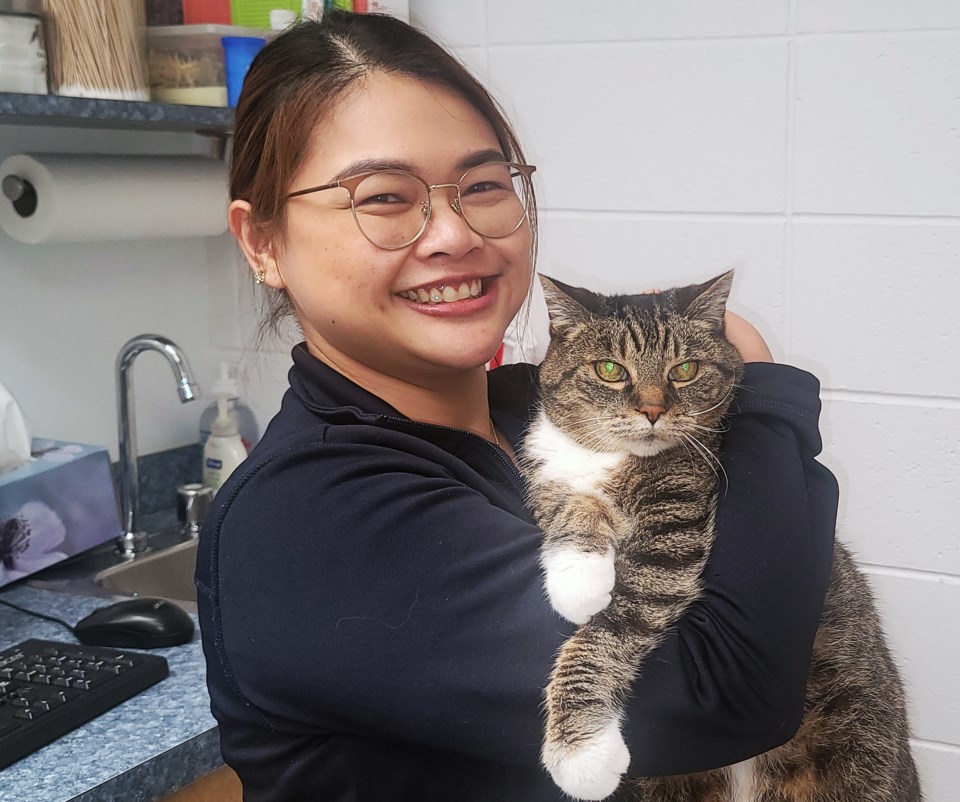In her native Thailand, veterinarian Prangthip Piandee wore several hats in her job taking charge of the health of sick or injured animals.
She was also the secretary who booked appointments, the lab technician who tested tissue samples, the pharmacist who dispensed medication and the cleaner who kept the place spic and span.
“In a hospital or clinic in Thailand it’s just you and one assistant and you do everything, we deal with everything by ourselves, compared to here, where you have a vet tech, a vet assistant, a receptionist – it’s a support team, which is very good,” said Piandee.
“I feel like I have a lot of people that support you and I don’t get work overload like it used to be in Thailand. When the doctor has to do everything it’s burnout sometimes.”
Piandee, a 31-year-old native of Sisaket, Thailand, was working in a Kelowna clinic as a veterinary technician when she met Matthew Cameron, a 37-year-old accountant-turned-carpenter with roots in Prince George, and he brought her back to his hometown when he took a job at Omineca Fabricating.
Since June, Piandee has been working as a vet assistant at Prince George Veterinary Hospital. She says veterinary skills are the same no matter what part of the world a doctor is working in. The only real differences are related to climate. The diseases animals contract in a tropical area are different from that of a cold-winter climate.
Thailand has nine veterinary colleges and produces about 1,000 graduates annually, compared to Canada, which has five schools that produce 350 graduates.
There’s a Canada-wide shortage of vets and that’s especially felt in Prince George, which does not have enough doctors to offer 24/7 emergency service.
Pet owners not already attached to a vet clinic are unable to get their pets’ health needs addressed because most veterinarians in the city are not taking new patients. The Prince George Humane Society has a backlog of surrendered animals that need to be spayed and neutered but the waitlist is months long due to the scarcity of doctors.
Piandee has friends practicing in Thailand who want to come to Canada but have no way to fast-track the paperwork needed for permanent residency. She’s hopeful the federal government will introduce a visa work program specifically geared toward veterinarians that would allow those doctors to start the process of obtaining Canadian licenses as soon as they arrive.
“A lot of them want to come up here but it’s so hard,” she said. “How can you stay here when it takes two or three years to become a vet again? It’s hard to bring everyone up here because the visa-immigration thing makes it difficult.”
She can’t stress enough to her Thai friends the importance of having proficiency in English.
“It’s a professional job and you have to talk to your clients and your co-workers,” Piandee said. “You need to have excellent communication skills and Thai people or foreign people if they want to work in Canada or the United States have to have that. Communication is the most important thing.”
Piandee practiced for two years in Bangkok after graduating university in 2017.
Two years ago, she married a Kelowna man and came over from Thailand. Their marriage gave her permanent residency status, which has allowed her to pursue the tests needed to prove her veterinary competency.
Piandee passed her English test but failed the Canadian Veterinary Medical Association National Examining Board theory exam she wrote a few weeks ago in Winnipeg. She plans to re-take the test after the mandatory four-month wait period.
By next summer, she hopes to take the North American Veterinary Licensing Exam. There are only 18 seats for the hands-on exam in Saskatoon, which is offered only for a two-week period in April and during a four-week window from November-December.
To circumvent the usual two- or three-year wait list just to get a seat for that test, she plans to go to the United States -- either Mississippi or Las Vegas -- where there is no wait.
The next step would be the preliminary surgical assessment and then she would have to pass a clinical proficiency test. The entire recertification process will cost her about $12,000.
She’s hoping by this time next year she will have her Canadian credentials. PG Veterinary Clinic has eight doctors on staff and enough fur-bearing customers to keep Piandee busy.
“It would be lovely to get her up and running, we’ve been trying to recruit doctors non-stop for I don’t know how many years, and we don’t get applicants,” said PG Vet office manager Heather Hannan.
“People don’t want to come to this area, they want to go to the big cities where there are emergency centres and things like that. It’s quite delightful to have somebody apply and we just need to get her through the process.”



